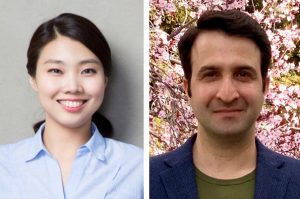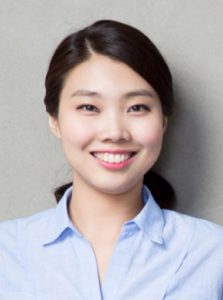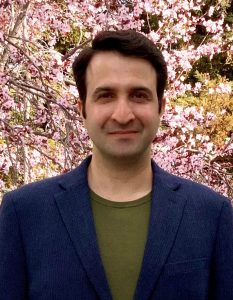
UW ECE is proud to welcome two new assistant professors, Jungwon Choi and Hossein Naghavi, who joined the Department this fall. Choi conducts research focused on enabling compact and reliable power conversion systems for electrification, as well as extending these systems to provide wireless power transfer. Naghavi is an expert in millimeter-wave and terahertz integrated circuit design, especially for imaging, spectroscopy, metrology, and communication applications.
UW ECE is proud to welcome two new assistant professors, Jungwon Choi and Hossein Naghavi, who joined the Department this fall. Choi conducts research focused on enabling compact and reliable power conversion systems for electrification, as well as extending these systems to provide wireless power transfer. Her work is applicable to a wide range of technologies, including battery-powered vehicles, biomedical devices, renewable energy systems, and other industrial applications. Naghavi is an expert in millimeter-wave and terahertz integrated circuit design, especially for imaging, spectroscopy, metrology, and communication applications. His research also has the potential to improve high-resolution sensing and imaging and high-speed communication networks.
“I am excited to have Jungwon and Hossein join our Department,” said UW ECE Professor and Chair Eric Klavins. “They each bring a high level of expertise and skill to their respective research areas. I am looking forward to seeing what they both will contribute, and I know that our students will greatly benefit from these new additions to our faculty.”
Jungwon Choi
 Jungwon Choi joins UW ECE from the University of Minnesota, where she was an assistant professor focused on power electronics, power semiconductor devices, wireless power transfer and magnetics. She received her doctoral degree in electrical engineering from Stanford University in 2019, her master’s degree in electrical engineering and computer science from the University of Michigan in 2018, and her bachelor’s degree in electrical engineering from Korea University in Seoul, Korea, in 2009.
Jungwon Choi joins UW ECE from the University of Minnesota, where she was an assistant professor focused on power electronics, power semiconductor devices, wireless power transfer and magnetics. She received her doctoral degree in electrical engineering from Stanford University in 2019, her master’s degree in electrical engineering and computer science from the University of Michigan in 2018, and her bachelor’s degree in electrical engineering from Korea University in Seoul, Korea, in 2009.
Choi’s research focus at UW ECE is in power electronics and sustainable energy, power semiconductor devices, control systems and magnetic designs. Her research interests include high-frequency power converters, wireless power transfer for battery-powered vehicles, industrial and biomedical applications, controls at high frequencies, energy storage, and wide bandgap devices.
In 2017, Choi was selected to be one of the Rising Stars in EECS at Stanford University. In 2019 and 2020, she received Unlock Ideas awards from Lam Research, and in 2021, she received a National Science Foundation (NSF) CAREER Award. She is the associate editor of the Institute of Electrical and Electronics Engineers (IEEE) Journal of Emerging and Selected Topics in Industrial Electronics, was a member of the organizing committee and vice chair of the 2023 IEEE Energy Conversion Congress & Expo and was on the Technical Program Committee and Organizing Committee of the IEEE Workshop on Control and Modeling for Power Electronics (COMPEL) in 2023 and 2024, respectively.
Hossein Naghavi
 Prior to joining UW ECE, Hossein Naghavi received his doctoral degree in August 2023 from the University of Michigan, focusing on terahertz integrated circuits. During his doctoral studies, he was a research scholar in the University of Michigan’s Radiation Laboratory, where he contributed to the development of the first fully integrated terahertz inverse synthetic aperture radar (ISAR) imaging system. From 2012 to 2016, he was the deputy technical manager of the Antenna Type Approval Laboratory at the University of Tehran, where he implemented several antenna and radio frequency measurement setups based on IEEE, Federal Communications Commission (FCC), and European Telecommunications Standards Institute (ETSI) standards. He received his master’s degree in electrical engineering from the University of Tehran, Iran, in 2013 and his bachelor’s degree from the Amirkabir University of Technology in 2009.
Prior to joining UW ECE, Hossein Naghavi received his doctoral degree in August 2023 from the University of Michigan, focusing on terahertz integrated circuits. During his doctoral studies, he was a research scholar in the University of Michigan’s Radiation Laboratory, where he contributed to the development of the first fully integrated terahertz inverse synthetic aperture radar (ISAR) imaging system. From 2012 to 2016, he was the deputy technical manager of the Antenna Type Approval Laboratory at the University of Tehran, where he implemented several antenna and radio frequency measurement setups based on IEEE, Federal Communications Commission (FCC), and European Telecommunications Standards Institute (ETSI) standards. He received his master’s degree in electrical engineering from the University of Tehran, Iran, in 2013 and his bachelor’s degree from the Amirkabir University of Technology in 2009.
Hossein’s research focuses on millimeter-wave and terahertz integrated circuit design, especially for imaging, spectroscopy, metrology, and communication applications. The terahertz frequencies he investigates have shown promising potential for a wide range of other, unique applications. For example, the short wavelength, see-through capability, and availability of wide bandwidth in the terahertz band makes terahertz frequencies a desirable option for high-resolution sensing and imaging and high-speed communication networks.
Hossein was a co-recipient of the Best Invited Paper award at the 2019 IEEE Custom Integrated Circuits Conference for fully integrated solutions for high-resolution terahertz imaging. He is also a lead contributor to developing traveling-wave energy enhancement devices (TWEED) for the Defense Advanced Research Projects Agency (DARPA).
UW ECE would like to thank the faculty search committee, which was chaired by UW ECE Professor Georg Seelig. The Department appreciates the committee members’ careful reviews, engaged participation and generous welcome toward the candidates.

